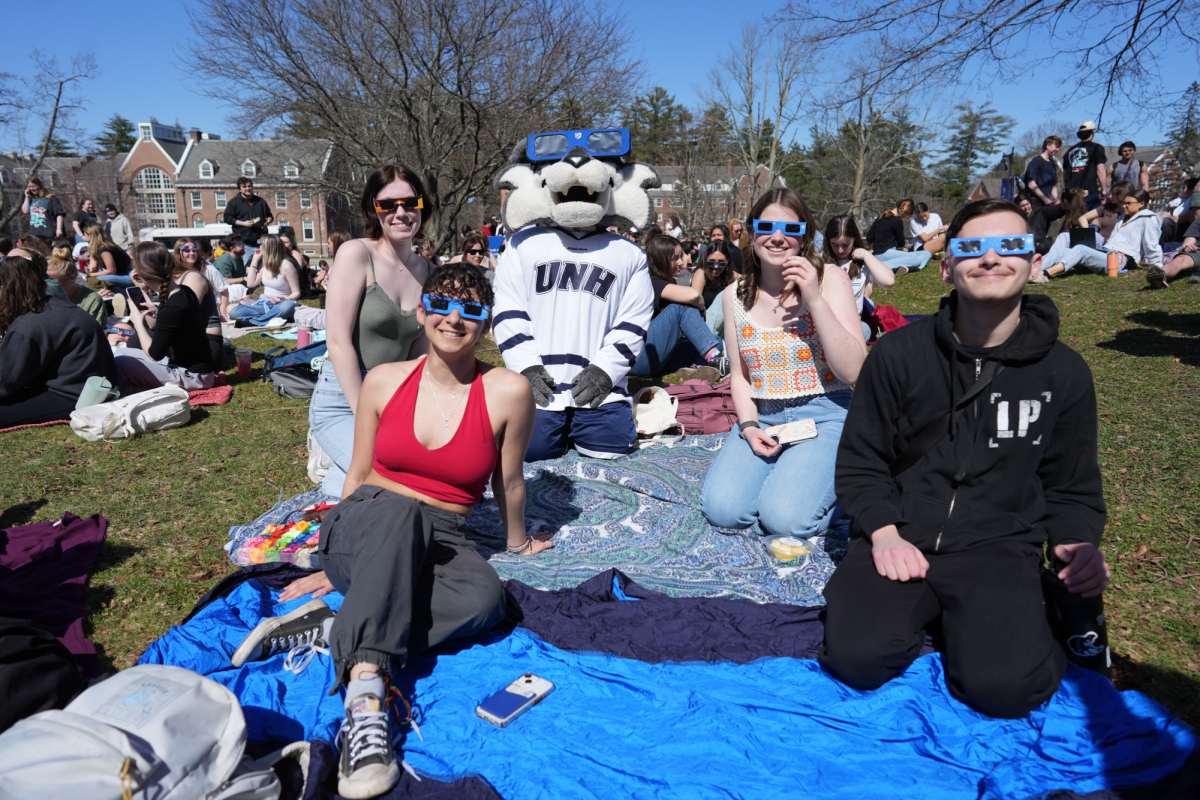Columbia Professor Mae Ngai Uncovers Anti-Asian Hate Origins at Annual Holden Lecture
April 18, 2023
Racist anti-Asian attacks, often violent and deadly, swept the nation as a result of the pandemic. To many, these attacks seem new, but they actually grow from deep, historical roots.
Dr. Mae Ngai, professor of Asian-American studies and history at Columbia University, addressed this history with UNH students and the public at the annual John T. Holden lecture in Hamilton Smith hall on April 4.
Titled “Shocking But Not Surprising,” Ngai’s lecture explored how anti-Chinese and anti-Asian racism has deep historical roots stemming from exclusionist policies in the 19th century. The lecture ended with an interactive question and answer session for Ngai to answer more in-depth questions.
Before beginning, faculty clustered at the front of the lecture hall, shaking hands and greeting Ngai as attendees filed in. A full lecture hall sat waiting and chattering behind them. College of Liberal Arts Dean Michelle Dillon and Professor Lucy Salyer from the History and Justice Studies Departments gave opening remarks.
Dillon emphasized that the Holden lecture allows the University to host particularly impactful lectures from experts outside of Durham. Past lectures have covered topics of polarization, uncivil discourse and gun rights as a public health hazard.
“It’s a wonderful opportunity every year because it allows us to invite social scientists, broadly defined, writers, other academics and commentators who have things that are important to say about American political life. It is a very broad spectrum of topics, timely topics,” Dillon said.
Salyer and Ngai met as fellows at the Radcliffe Institute for Advanced Study at Harvard University in 2003; both were working on their own books at the time. Since then, the two have remained colleagues and friends. Dillon explained that Salyer and the History department’s efforts were what brought Ngai to UNH today.
“She remains a dedicated citizen of the world today. Professor Ngai seeks to reveal the past and the present, to expose the past patterns in our national and global histories that shape our current social dynamics and legal battles,” Salyer said.
After the introduction, Ngai took to the podium to begin her lecture. She wore a black blazer, a pink shirt and rectangular glasses that sat under her short, side-swept hair. She began by thanking Salyer for the introduction, which caused her to feel “embarrassed;” the laughs drew some lightheartedness into the room.
While speaking, a visual presentation was projected onto the wall behind Ngai. The first images were of Asian women, from places such as Atlanta and New York City, who were victims of hate crime attacks. She pulled listeners in further with an anti-Asian hate incident of her own.
“I had my own experience in New York in March of 2021, when a man passing me on Broadway gave me a hard shove as he walked by. He said nothing, but I knew it was deliberate and I knew it was racially motivated,” Ngai said.
Ngai then moved into the historical origins of anti-Asian hate which draws on research from her book, “The Chinese Question,” published in 2021. She identifies a series of laws and events that defined the Chinese as an “unassimilable” race.
Beginning with the Chinese Exclusion Act, which prohibited Chinese immigration in the 19th century, the law was extended to all Asians until 1952. Ngai noted that the idea that Asians pose a racial danger in American society has continued to endure today.
“Imagine there had been no exclusion laws and that Chinese and other Asians had continued to freely immigrate to the United States,” Ngai said. “California, the West, indeed the whole country would look very different.”
Asians currently make up less than 6% of the total U.S. population, but as Ngai explained, many Americans still believe Asians do not belong here, thus hate crime attacks continue to occur.
Ngai also touched on the harmful effects of the California Gold Rush of 1848-49, the Transcontinental Railroad and various other international exclusion laws. She noted that the Jim Crow laws and Asian exclusion laws were interconnected acts of white supremacy: “one in the South and one in the West.”
“These policies rely on euphemisms and legal fiction, like separate but equal, for aliens eligible for citizenship to work around the fourteenth amendment’s protection and due process for all,” Ngai said. “Frederick Douglas understood that the futures of the South and the West were intertwined and together they would determine the fate of the nation as a whole.”
In the 21st century, Ngai added that Americans also fear China’s rise as a global economic power, the idea that Asian immigrants will work for less, and the rampant model minority myth in schools and workplaces.
Ngai built off the work of sociologist Stuart Hall to explain the dangers of believing racial myths. Outside of stereotypes, she explains it is an ideological way of looking at the world to explain structures of inequality.
“The choice between inclusion and exclusion is part of the struggle for democracy which is, my view, the heart of all politics,” Ngai said.






























